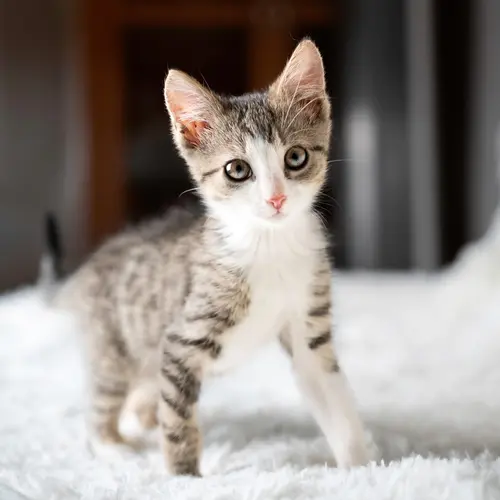Just like humans, your cat may be allergic to a variety of things that they can breathe in, eat, or touch. Allergies in cats manifest when a cat’s body becomes sensitive to substances in their environment. As your cat tries to process and get rid of these irritating substances, they may show a variety of symptoms.
If your cat has allergies, some of the most common allergic reactions in cats cause the following behaviors, conditions, and symptoms:
Types and Causes of Cat Allergies
There are 4 common allergies in cats: environmental, fleas, food, and seasonal. This section elaborates on these types of allergies and the different ways in which they may affect your cat.
Environmental allergies. Substances that cause environmental allergies include pollen, grass, fungi, mold, and dust. Your cat may also have allergies to things like cigarette smoke, perfume, air fresheners/ diffusers, candles, and some cleaning products.
Flea allergies. When a small insect known as a flea bites your cat, it causes an allergic reaction that can be very irritating. The saliva from a flea bite can affect a cat’s entire body, not just where the cat was bitten. Your veterinarian can help you choose the right flea prevention product to help protect your cat.
Food allergies. Some cats may have allergies to certain foods. This can cause skin itchiness, vomiting, or diarrhea. Your veterinarian can help you find out which foods are irritating your cat and create an appropriate diet.
Atopic dermatitis. When a cat experiences allergies, their bodies can often react with a skin condition called atopic dermatitis. With this condition, your cat may develop skin sores, scabbing, hair loss, and redness.
Environmental and flea allergies are usually treated by your veterinarian using the same meds, often including skin creams or a prescribed medication.
What Should I Do if I Think My Cat Has Allergies?
If you suspect that your cat has allergies, schedule an appointment with your vet. Given that there are so many different kinds of cat allergies, your vet can help diagnose the cause of your cat’s issues and determine the appropriate treatment.
How Are Cat Allergies Diagnosed?
Treatment for cat allergies depends on your cat’s unique situation. True allergy testing is usually done by a veterinary dermatologist, but a general veterinary practitioner will conduct a full workup on your cat. The vet will review your cat’s medical history and give them a complete physical exam.
They will look for fleas using a flea comb, perform a skin scrape for skin mites, tape prep for bacteria and fungal infections, examine ear debris to look for bacteria and yeast, test their blood to evaluate for underlying medical issues, and conduct a diet trial to rule out food allergies.
For a blood test, the vet will take a sample of the cat’s blood and send it to a lab for evaluation. For a skin test, small injections are given to the cat just under the skin. If your cat is allergic to a particular substance, a hive will often appear on their body.
After the vet determines what’s causing the allergic reaction, they can then prescribe the right solution.
How Are Cat Allergies Treated?
If you are trying to help your cat manage their allergies, the best thing you can do is to prevent them from entering your cat's environment in the first place. For instance, you can:
- Use veterinarian approved flea and tick control
- Use dust-free cat litter
- Bathe your cat to relieve itching
- Keep your home clean of dirt and dust
- Wash your cat's bedding regularly
- Provide your cat with a healthy diet
- Avoid smoking around your pets
In some cases, your vet may provide your cat with a daily prescription or dietary supplements.
Cat Allergy Medications
There are a number of different medications available to treat cat allergies. Some of the most common medications include:
- Cortisone/steroid pills (anti-itch medicine)
- Lotions, ointments, ear drops, or eye drops
- Antihistamines
- Flea prevention products
Always talk to your vet before giving a new medication to your cat.
Are Cat Allergies and Cat Asthma Related?
Cats with asthma are more likely to experience cat allergies. If your cat has both asthma and allergies, your veterinarian will likely prescribe a medication that can help open your cat’s airway temporarily. Long-term treatments may include medications like corticosteroids or a steroid inhaler and aerosol chamber for administration.


